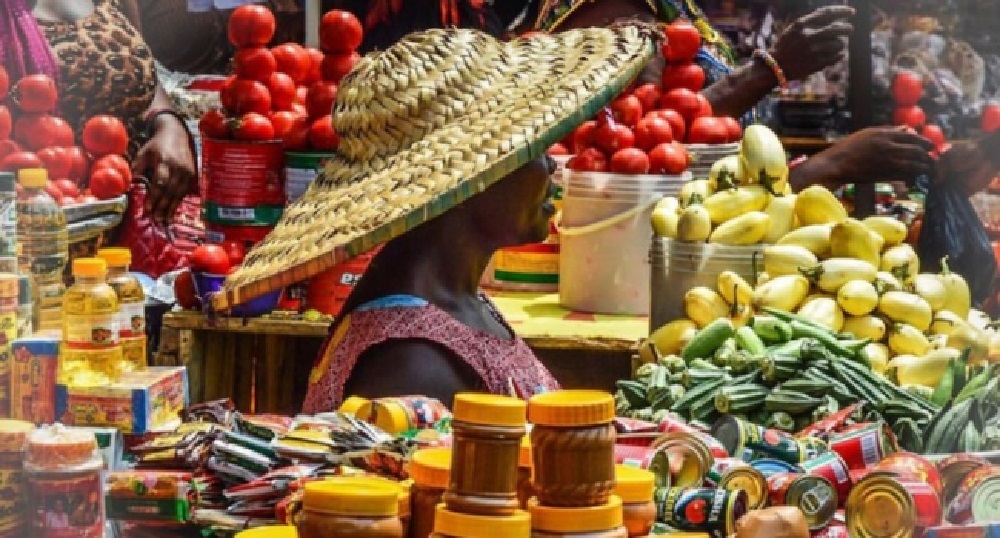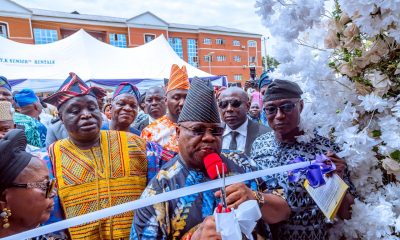Economy
FG, Afreximbank partner on $1bn healthcare investment

The Federal Government and African Export-Import Bank (Afreximbank) have committed to a $1 billion partnership to revolutionise Nigeria’s healthcare sector.
The $1 billion Healthcare Value Chain Programme established through a Memorandum of Understanding between Afreximbank and the Federal Ministry of Health is geared at improving access to quality healthcare, reduce medical tourism, and empower the domestic healthcare workforce.
This initiative falls under the Presidential Initiative for Unlocking Healthcare Value Chains, PVAC, with a view to comprehensively strengthening Nigeria’s healthcare sector.
In a meeting with Afreximbank President, Professor Benedict Oramah, at the Presidential Villa yesterday, President Bola Tinubu said: “We welcome this significant step towards investing in Nigeria’s healthcare sector.
”This facility is a great commitment to humanity. We are open and ready to assist this project in every way possible.”
The President noted that the initiative would reduce the need for outbound medical tourism by providing exceptional care within Nigeria and also stem the tide of healthcare talent migration by fostering a thriving domestic healthcare sector.
On his part, the Afreximbank President and Chairman of the Board of Directors, Prof. Benedict Oramah, said: “For too long, our continent has watched as its best and brightest medical minds have migrated to Europe and America.
”But we are now poised to develop a domestic healthcare sector which can retain talent, eventually rivalling and even surpassing systems in other regions.”
The discussions also focused on the transformative potential of the 500-bed African Medical Centre of Excellence, AMCE, Abuja, currently nearing completion and its broader impact on healthcare across the continent.
The AMCE Abuja, the first of five planned across Africa, is poised to become a leading centre for research, clinical services, and medical education.
It will focus on three critical non-communicable diseases – Oncology, haematology, and Cardiology – alongside general care capabilities.
This, coupled with collaborations with global partners, such as King’s College London, the University of Wisconsin Teaching Hospital, and Christies Hospital Manchester, demonstrates a new direction for African healthcare provision.
According to Oramah, AMCE Abuja will not only provide world-class medical services but also serve as a training ground for future generations of healthcare professionals.
“Afreximbank, in collaboration with King’s College London, is establishing a Medical & Nursing School in Abuja to support this mission.
”This initiative, along with partnerships with other medical institutions across Africa, aims to create a sustainable pool of skilled medical personnel within the continent,” he said.
AFC commits $40m to build Africa’s first medical centre of excellence in Abuja
Meanwhile, Africa Finance Corporation, AFC, a leading infrastructure financier, has pledged up to $40 million to support the construction of the first African Medical Centre of Excellence, AMCE, in Abuja.
The 500-bed facility is being developed by the Africa Export-Import Bank (Afreximbank), in partnership with King’s College Hospital, London, KCH, following an agreement reached at the inaugural AMCE African Health Forum in Abuja weekend.
The project is set to strategically leverage KCH’s unmatched diagnostic, clinical, and capacity-building expertise, focusing on three core non-communicable diseases, namely oncology, cardiology, and haematology.
With a commitment to world-class research, education, and development, AMCE aims to establish itself as a leader in clinical services.
The AMCE initiative signals a healthcare revolution in West Africa, aiming to redirect the course of medical tourism away from the continent.
It envisions the creation of a series of world-class medical centres of excellence in Africa, providing widespread access to critical healthcare in the region.
AMCE Abuja, a first-of-its-kind medical treatment and research center, will unfold in four phases over six years.
AFC, as a new shareholder, will play a pivotal role in the initial phase, involving the construction of a 170-bed specialist hospital, set to expand to 500 beds by the third phase.
With construction progress already over halfway complete, the facility is on track to commence operations in the first quarter of 2025.
Samaila Zubairu, AFC President and CEO, expressed the organization’s commitment to transforming healthcare in Africa and contributing to a reversal in medical tourism.
He emphasized the importance of building a world-class facility that captured medical spending in Africa, promotes specialist skills development, and attracts healthcare practitioners to local communities.
Benedict Oramah, President and Chairman of the Board of Directors of Afreximbank, lauded AFC’s partnership, emphasizing its significance in addressing Africa’s healthcare infrastructure challenges.
He called for more partners to join this crucial endeavour to revolutionize healthcare in Africa and make a lasting impact on community well-being.
Economy
SEE current exchange rate of the Dollar to Naira

What Is the Dollar to Naira Exchange Rate at the Black Market (Aboki FX)?
Here is the Dollar to Naira exchange rate at the parallel market, popularly known as the black market (Aboki fx), for Tuesday, April 23, 2025.
You can exchange your dollars for naira at the following rates:
Black Market Exchange Rate (Lagos – April 23, 2025):
According to sources at the Bureau De Change (BDC), the exchange rate at the Lagos parallel market saw traders buying at ₦1610 and selling at ₦1620 per US dollar.
It’s important to note that the Central Bank of Nigeria (CBN) does not recognize the black market. The CBN advises individuals seeking foreign exchange transactions to do so through their banks.
Dollar to Naira Exchange Rates
Market Type Buying Rate Selling Rate
Black Market ₦1610 ₦1620
CBN Official Rate ₦1591 (Low) ₦1606 (High)
Note: Forex rates vary across dealers and regions, and actual rates may differ from those listed.
Meanwhile, the Nigeria Customs Service (NCS) has announced the seizure of 298 smuggled items worth ₦7.6 billion between January and March 2025. The NCS also disclosed that it generated a total revenue of ₦1.75 trillion in the first quarter of the year.
Economy
Volvo announces termination of 800 U.S. workers, cites tariff, market decline

Volvo Group has announced plans to lay off up to 800 workers at three of its U.S. facilities over the next three months, citing ongoing market uncertainty and declining demand exacerbated by tariffs introduced under the administration of President Donald Trump.
The affected locations include the Mack Trucks plant in Macungie, Pennsylvania, as well as Volvo Group sites in Dublin, Virginia, and Hagerstown, Maryland.
In a statement on Friday, Volvo Group North America confirmed that between 550 and 800 employees would be impacted.
The company, a subsidiary of Sweden’s AB Volvo, employs nearly 20,000 people across North America.
The layoffs come amid wider turmoil in the automotive and manufacturing sectors, as shifting U.S. trade policy and a series of tariffs continue to drive up production costs. Economists have pointed to the uncertainty surrounding Trump’s trade strategy as a factor undermining both business and consumer confidence, with concerns mounting over a potential economic slowdown or recession.
According to Volvo, the company is grappling with a decline in heavy-duty truck orders, driven by instability in freight rates, anticipated regulatory changes, and the growing financial burden of tariffs. “We regret having to take this action, but we need to align production with reduced demand for our vehicles,” a company spokesperson stated in an email quoted by Reuters.
Volvo’s announcement marks another blow to an industry already navigating a complex web of supply chain challenges and fluctuating market conditions, with other manufacturers also warning of potential cost hikes and disruptions tied to global trade disputes.
Economy
Inflation surged to 24.23% due to escalating cost of living

Inflationary pressure has reappeared as Nigerians grapple with increases in average costs of basic food items and energy.
For the first time after the rebasing of the Consumer Price Index (CPI), headline inflation spiked in March to 24.23 per cent – 105 basis points above the 23.18 per cent recorded in the previous month.
The National Bureau of Statistics (NBS) yesterday indicated that the rate of increase in the average price level was higher in March than the level in February.
In January, the NBS updated the weight and price reference periods in calculation of the CPI to make the inflationary gauge more reflective of changes in consumption patterns and the economy generally.
The rebasing did not only brought the base year closer to the current period from 2009 to 2024, it also introduced some critical methodology changes to improve the computation processes.
After the rebasing, inflation dropped from 34.80 per cent in the pre-rebased period of December 2024 to 24.48 per cent in January 2025. It dropped further to 23.18 per cent in February.
In its latest report, NBS recorded 186 basis points changes between the monthly inflation rate, with the month-on-month rate rising from 2.04 per cent in February to 3.90 per cent in March.
The NBS attributed the spike to the rise in costs of food and alcoholic beverages, fuels and electricity, among other items.
Analysts at CardinalStone said the resurgence was due to renewed foreign exchange (forex) pressures amid heightened global risk-off sentiment.
They pointed at foreign portfolio investments (FPIs) outflows and increased dollar demand, which saw naira dropping by 2.4 per cent in March.
Experts also cited increase in price of Premium Motor Spirit (PMS) or petrol, following the temporary suspension of the naira-for-crude swap arrangement.
Food inflation rate stood at 21.79 per cent in March 2025. The composite food index decreased to 21.79 per cent from 23.51 per cent.
Core inflation, which excludes volatile agricultural produce prices and energy, rose to 24.43 per cent from 23.01 per cent.
Specifically, the month-on-month food inflation rose by 50 basis points from 1.67 per cent in February to 2.18 per cent in March.
The NBS attributed the increase in food inflation to increases in the average prices of basic food items including ginger, garri, broken rice, honey, crabs, potatoes, plantain flour, periwinkle and pepper amongst others.
On a state-by-state basis, food inflation was higher in Oyo with 34.41 per cent; Kaduna (31.14 per cent) and Kebbi (30.85 per cent).
On the other side, the 9.61 per cent recorded by Bayelsa; Adamawa (12.41 per cent) and Akwa Ibom (12.60 per cent), were the lowest inflation rates.
Analysts expressed concerns that the resurgent inflationary pressure might lead to renewed tightening stance by the Central Bank of Nigeria (CBN).
CBN Governor Dr. Olayemi Cardoso, had at the end of the first Monetary Policy Committee (MPC) meeting in 2025, reiterated the apex bank’s commitment to orthodox monetary policies, noting that the apex bank’s stance will be reflective of the inflationary trend.
With inflation rate dropping in February, the MPC had decided to maintain all key monetary policy parameters, including the Monetary Policy Rate (MPR) at 27.50 per cent, the asymmetric corridor around the MPR at +500/-100 basis points, the Cash Reserve Ratio (CRR) at 50.00 per cent for Deposit Money Banks and 16.00 per cent for Merchant Banks, and the Liquidity Ratio at 30.00 per cent.
Clarifying the impact of the rebased CPI, Cardoso had explained that the lower inflation figure should not be misinterpreted.
He underlined the need to analyse more data before drawing comparisons, noting that the CBN is currently assessing the figures and will provide further guidance in due course.
The CBN boss stressed the critical importance of collaboration between monetary and fiscal authorities in sustaining recent economic improvements.
Addressing concerns about the impact of elevated borrowing costs on economic growth, the CBN governor assured that the apex bank’s primary objective is to stabilize the foreign exchange and financial markets.
He expressed confidence that such stability would attract increased foreign investments, stimulating the much-needed economic growth.
Cardoso also highlighted the competitiveness of the Nigerian currency, which has spurred growing interest from international investors.
-

 News22 hours ago
News22 hours agoDelta to transform into complete APC state as 25 PDP Local Government Chairmen set to defect
-

 News11 hours ago
News11 hours agoINSECURITY! Enough is enough, Tinubu tells security chiefs, NSA
-

 News11 hours ago
News11 hours agoJust in: Air Peace suspends all scheduled flights nationwide
-

 News10 hours ago
News10 hours agoINEC moves to legalise voting without PVC
-

 News22 hours ago
News22 hours agoMoji Danisa to Be Honoured by NUJ FCT for Her Impact in Tabloid Journalism
-

 News6 hours ago
News6 hours agoJust in: PDP can never die over gale of defection -Hon Teejay Yusuf insists
-

 News22 hours ago
News22 hours agoFinally, FG Releases N50bn to ASUU, Varsity Unions for Earned Allowances
-

 News16 hours ago
News16 hours agoLegacy Honoured in Ede as Leadership Centre Opens in Memory of Isiaka Adeleke+PHOTOS






